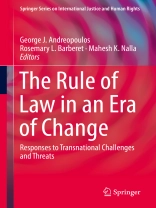This forward-thinking volume examines the rule of law from a global perspective, in the context of a growing array of transnational challenges and threats As the United Nations (UN) notes, the rule of law constitutes the basis “on which fair and just societies are built.” The contributions to this volume provide insights to several emerging debates about what the rule of law means in the modern era of warfare and of massive and systematic human rights violations that call for robust and transparent accountability mechanisms and processes.
The authors of this work examine several controversial topics, including:
-The growing use of drones, and the morality of long distance use
-The UN Security Council’s evolving counterterrorism policies and practices
-Victims’ Rights and the effort to provide meaning and justice to victims and survivors of terrorism
– The relationship between the International Criminal Court (ICC) and Truth and Reconciliation Commissions (TRCs)
-The effectiveness of the international criminal justice process overall, with an eye to procedural fairness and justice.
This timely work will be of interest to researchers in criminal justice, particularly with a focus on counter-terrorism and international justice, as well as international law, human rights, and international studies.
Table des matières
Introduction.- Drones, Distance and Death.- War as Play, War as Slaughter, and the Laws of War.- Humanizing the Counter-terrorist Discourse at the UNSC.- Victims of Terrorist Associations after September 11.- Humanizing the Counter-terrorist Discourse at the UNSC.- Victims of Terrorist Associations after September 11.- The Relationship between the ICC and Truth Commissions.- Legal Assumptions and Unintended Meanings before International Criminal Courts.
A propos de l’auteur
George Andreopoulos is Professor of Political Science at John Jay College of Criminal Justice and at the Graduate Center, City University of New York, and the founding Director of the Center for International Human Rights at John Jay College. Before coming to CUNY, he taught for several years at Yale University, where he was also the founding Associate Director of the Orville Schell Center for International Human Rights. He has written extensively on international organizations, international human rights, and international humanitarian law issues and has lectured widely at US and European universities. Over the years, he has participated in several human rights missions and has been a consultant for the United Nations and NGOs. He is Series Editor of the Springer Series on International Justice and Human Rights; President of the Interdisciplinary Studies Section (IDSS) of the International Studies Association (ISA); and former President of the Human Rights Section of the American Political Science Association (APSA).
Rosemary Barberet is Professor in the Sociology Department at John Jay College of Criminal Justice who teaches in the MA and BA programs in International Criminal Justice. Trained in criminology in the United States (Ph D, University of Maryland, 1994), she spent the first 15 years of her academic career in Europe (Spain and England). Dr. Barberet’s research interests include the use of criminal justice data and research in policymaking, crime indicators, victimization, gender and crime and cross-cultural methodology. Dr. Barberet was awarded the Herbert Bloch Award of the American Society of Criminology for service to the society and to the professional interests of criminology, as well as the Rafael Salillas Award of the Sociedad Espanola de Investigación Criminológica. Her most recent book, Women, Crime and Criminal Justice: A Global Enquiry won awards from both the Division of International Criminology of the American Society of Criminology and the International Section of the Academy of Criminal Justice Sciences. Dr. Barberet represents the International Sociological Association (ISA) at the United Nations and is a member of the ISA Executive Committee.
Mahesh K. Nalla is Professor of Criminal Justice at Michigan State University in East Lansing, Michigan, USA. His current research projects are focused in emerging and transitional democracies on two broad areas: Governance, legitimacy, and social regulation (public & private policing); and, gendered spaces, victimization, and public health. He had coordinated and led a global project firearm related violence prevention programs for the United Nations that covered over 180 countries. His research appeared in leading journals that include the Journal of Research and Crime and Delinquency, Justice Quarterly, and European Journal of Criminology, among others.
dgvdzvzv












